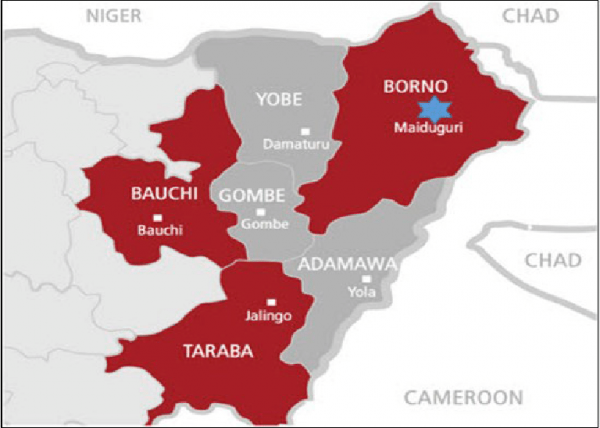The United Nations Office for the Coordination of Humanitarian Affairs says it received at least $1.1bn in its humanitarian response in Nigeria’s northeast in the past 18 months.
OCHA’s Humanitarian Dashboard for January 2022 to June 2023 showed that 11.6 million locals had been targeted for food, health and shelter, among other forms of intervention in Borno, Adamawa and Yobe states.
However, the Office could only reach 8.3 million of that number due to a “funds shortage.” This population comprises three groups: Internally Displaced Persons, returnees and inhabitants of host communities.
Fourteen years after Boko Haram began its gory campaigns in Nigeria’s North-East, OCHA says the ensuing humanitarian crisis remains one of the most complex in the world.
In June 2021, the United Nations Development Programmes estimated at least 350,000 deaths from conflicts with Boko Haram since 2009.
The UNDP cited damage to agriculture, water, trade, food and healthcare, saying, “Many more have died from the indirect effects of the conflict.”
At least, 66,768 lives were lost in states most affected by the conflict—Borno, Adamawa, Yobe, Zamfara, Kaduna Benue and Plateau—a September 2023 survey by the Council of Foreign Relations showed.
Nonetheless, direct deaths alone do not paint the full picture of the conflict.
Boko Haram, which aims to banish Western influence and create a Salafi-Islamist state in Northeast Nigeria and the entire nation, has also displaced over three million people, the United Nations High Commission for Refugees said.
In October 2017, then-president Muhammadu Buhari, signed into law the establishment of the North East Development Commission in October 2017, to lead the reconstruction and development of Nigeria’s northeast.
NEDC earmarked N31.01tn in its 10-year North East Stabilisation and Development Master Plan, in September 2022.
It said the amount is to be sourced from “a robust partnership with humanitarian actors such as International Non-Governmental Organisations, INGOs, captains of industries and investors worldwide.
In OCHA’s 2022 Dashboard, it said, “To date, the Humanitarian Response Plan is now 70 per cent funded. Of the US $1.1 billion requested funding, some sectors remain vastly underfunded, forcing response partners to prioritise interventions in communities ranked highest on the severity scale.
“Despite this funding shortfall, 124 humanitarian actors are responding to the most acute needs. Together, they delivered some form of humanitarian assistance to 4.7 million people since January 2022, accounting for 84 per cent of the estimated people identified for assistance.”
However, OCHA warned that “if the funding deficit continues, a number of life-saving programmes across Borno, Adamawa and Yobe states will have to scale down or shut down completely.”
In the period under review, the Office said it received $9m on Camp Coordination and Management despite targeting $51.4m; $22.5m for early recovery & livelihoods despite a $133.6m target, $14.7m on education while needing $194.2m, $454.4m on food security with an initial target of $921.1m.
Health gulped $117.6m with an initial target of $221.5; nutrition, $120.2, initially targeting $$277.5. OCHA received $31.7 for shelter and non-food items and $8.7m for water, sanitation and hygiene from its 123 partners.
When reached for comments, the spokesperson for the Ministry of Humanitarian Affairs and Poverty Alleviation, Mrs Rhoda Iliya, was not readily available for a statement.
Punch

